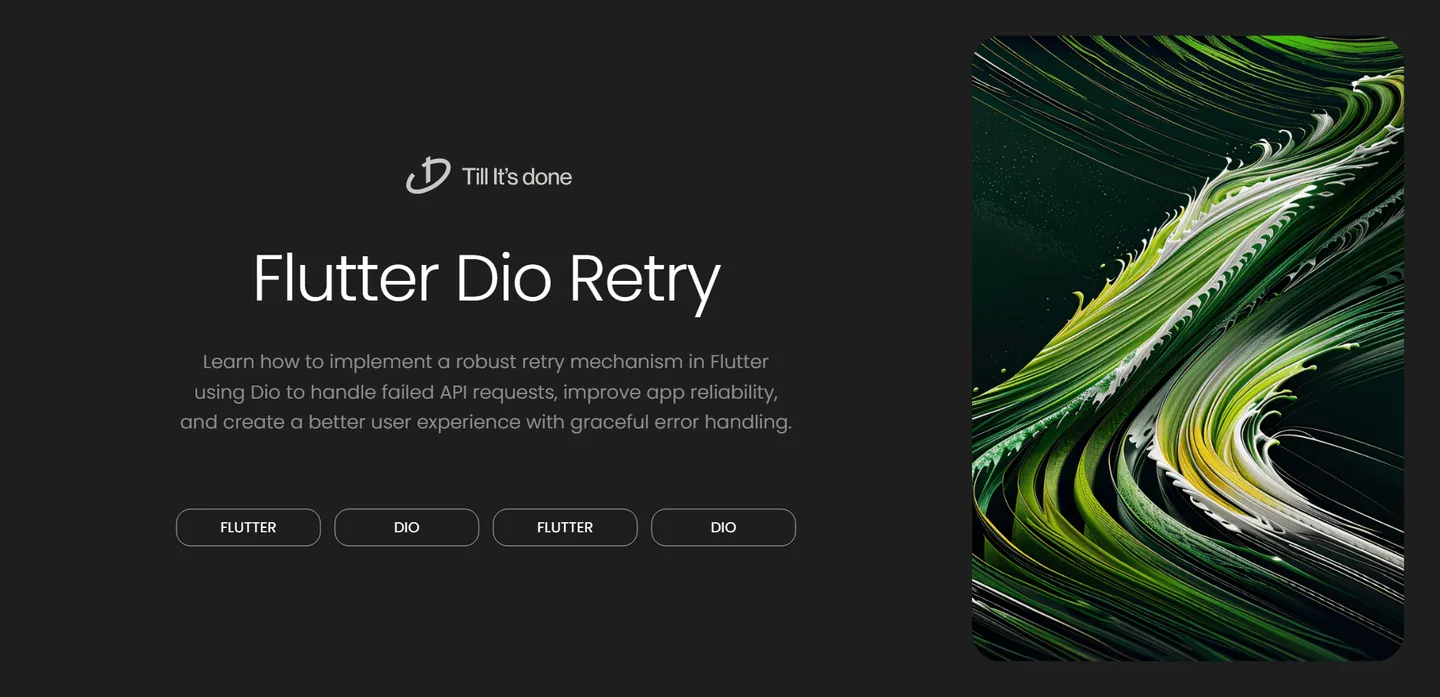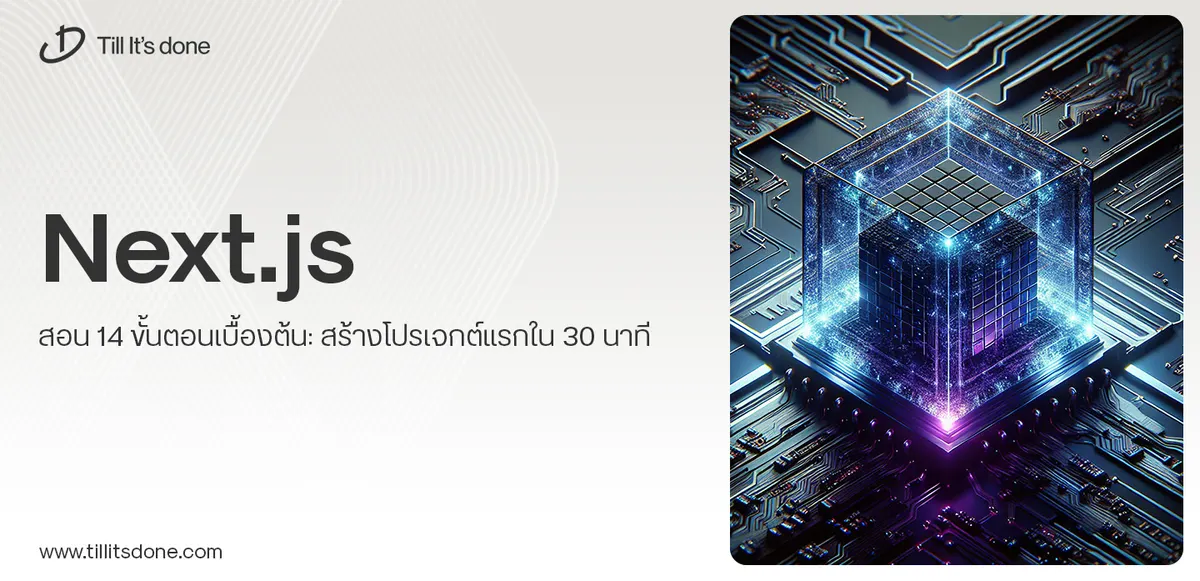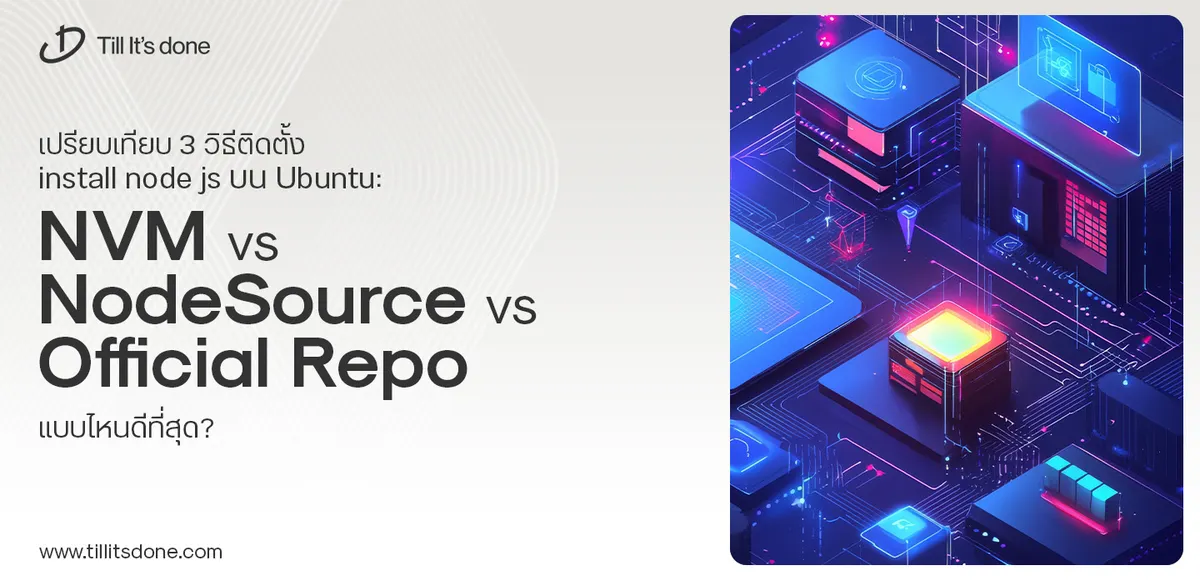- Services
- Case Studies
- Technologies
- NextJs development
- Flutter development
- NodeJs development
- ReactJs development
- About
- Contact
- Tools
- Blogs
- FAQ
Implement Dio's Retry for Failed Requests

Implementing Dio’s Retry Mechanism for Failed Requests in Flutter

In the world of mobile app development, handling network requests efficiently is crucial for delivering a smooth user experience. One common challenge we face is dealing with failed API requests. Network issues, server timeouts, or temporary outages can all lead to failed requests. Today, we’ll explore how to implement a robust retry mechanism using Dio in Flutter to handle such scenarios gracefully.
Understanding the Need for Retry Logic
When making API calls, things don’t always go as planned. Maybe the user’s internet connection dropped for a split second, or the server experienced a momentary hiccup. Instead of immediately showing an error to users, implementing a retry mechanism can help maintain a seamless experience by attempting to recover from these temporary failures.

Setting Up the Retry Interceptor
Let’s create a custom interceptor that will handle the retry logic for our Dio client. We’ll make it configurable so you can adjust the retry attempts and delay between retries based on your needs.
Here’s how we can implement our retry mechanism:
class RetryInterceptor extends Interceptor { final Dio dio; final int maxRetries; final Duration retryDelay;
RetryInterceptor({ required this.dio, this.maxRetries = 3, this.retryDelay = const Duration(seconds: 1), });
@override Future onError(DioException err, ErrorInterceptorHandler handler) async { int retryCount = 0;
if (_shouldRetry(err)) { while (retryCount < maxRetries) { try { retryCount++;
await Future.delayed(retryDelay * retryCount);
final response = await dio.request( err.requestOptions.path, options: Options( method: err.requestOptions.method, headers: err.requestOptions.headers, ), data: err.requestOptions.data, queryParameters: err.requestOptions.queryParameters, );
return handler.resolve(response); } on DioException catch (e) { if (retryCount >= maxRetries) { return handler.next(e); } } } }
return handler.next(err); }
bool _shouldRetry(DioException error) { return error.type == DioExceptionType.connectionTimeout || error.type == DioExceptionType.sendTimeout || error.type == DioExceptionType.receiveTimeout || error.type == DioExceptionType.connectionError; }}
Implementing the Retry Mechanism
Now that we have our interceptor ready, let’s see how to integrate it into our Dio client:
Dio createDioWithRetry() { final dio = Dio();
dio.interceptors.add( RetryInterceptor( dio: dio, maxRetries: 3, retryDelay: const Duration(seconds: 2), ), );
return dio;}This setup will automatically retry failed requests up to three times, with an exponential delay between attempts. The delay starts at 2 seconds and doubles with each retry, giving servers time to recover and preventing request flooding.
Best Practices and Considerations
-
Choose Appropriate Retry Conditions: Not all errors should trigger retries. Focus on transient failures like network timeouts rather than server errors (400s, 500s).
-
Implement Exponential Backoff: Increasing the delay between retries helps prevent overwhelming the server and gives it time to recover.
-
Set Reasonable Limits: Don’t set too many retry attempts, as this could lead to poor user experience. Three to five retries is usually sufficient.
-
Monitor and Log: Keep track of retry attempts and success rates to help identify recurring issues that might need addressing at the server level.

Conclusion
Implementing a retry mechanism in your Flutter app using Dio is a powerful way to handle network instabilities and improve user experience. By following these patterns and best practices, you can create more resilient applications that gracefully handle temporary failures and maintain seamless functionality for your users.
 สร้างเว็บไซต์ 1 เว็บ ต้องใช้งบเท่าไหร่? เจาะลึกทุกองค์ประกอบ website development cost อยากสร้างเว็บไซต์แต่ไม่มั่นใจในเรื่องของงบประมาณ อ่านสรุปเจาะลึกตั้งแต่ดีไซน์, ฟังก์ชัน และการดูแล พร้อมตัวอย่างงบจริงจาก Till it’s done ที่แผนชัด งบไม่บานปลายแน่นอน
สร้างเว็บไซต์ 1 เว็บ ต้องใช้งบเท่าไหร่? เจาะลึกทุกองค์ประกอบ website development cost อยากสร้างเว็บไซต์แต่ไม่มั่นใจในเรื่องของงบประมาณ อ่านสรุปเจาะลึกตั้งแต่ดีไซน์, ฟังก์ชัน และการดูแล พร้อมตัวอย่างงบจริงจาก Till it’s done ที่แผนชัด งบไม่บานปลายแน่นอน  Next.js สอน 14 ขั้นตอนเบื้องต้น: สร้างโปรเจกต์แรกใน 30 นาที เริ่มต้นกับ Next.js ใน 14 ขั้นตอนเพียงแค่ 30 นาที พร้อม SSR/SSG และ API Routes ด้วยตัวอย่างโค้ดง่าย ๆ อ่านต่อเพื่อสร้างโปรเจ็กต์แรกได้ทันทีที่นี่
Next.js สอน 14 ขั้นตอนเบื้องต้น: สร้างโปรเจกต์แรกใน 30 นาที เริ่มต้นกับ Next.js ใน 14 ขั้นตอนเพียงแค่ 30 นาที พร้อม SSR/SSG และ API Routes ด้วยตัวอย่างโค้ดง่าย ๆ อ่านต่อเพื่อสร้างโปรเจ็กต์แรกได้ทันทีที่นี่  วิธีสมัคร Apple Developer Account เพื่อนำแอปขึ้น App Store ทีละขั้นตอน อยากปล่อยแอปบน App Store ระดับโลก มาอ่านคู่มือสมัคร Apple Developer Account พร้อมเคล็ดลับ TestFlight และวิธีอัปโหลดที่ง่ายในบทความเดียวนี้ได้เลย
วิธีสมัคร Apple Developer Account เพื่อนำแอปขึ้น App Store ทีละขั้นตอน อยากปล่อยแอปบน App Store ระดับโลก มาอ่านคู่มือสมัคร Apple Developer Account พร้อมเคล็ดลับ TestFlight และวิธีอัปโหลดที่ง่ายในบทความเดียวนี้ได้เลย  TypeScript Interface คืออะไร? อธิบายพร้อมวิธีใช้และข้อแตกต่างจาก Type เรียนรู้วิธีใช้ TypeScript Interface เพื่อสร้างโครงสร้างข้อมูลที่ปลอดภัยและเข้าใจง่าย พร้อมเปรียบเทียบข้อดีข้อแตกต่างกับ Type ที่คุณต้องรู้ ถูกรวมเอาไว้ในบทความนี้แล้ว
TypeScript Interface คืออะไร? อธิบายพร้อมวิธีใช้และข้อแตกต่างจาก Type เรียนรู้วิธีใช้ TypeScript Interface เพื่อสร้างโครงสร้างข้อมูลที่ปลอดภัยและเข้าใจง่าย พร้อมเปรียบเทียบข้อดีข้อแตกต่างกับ Type ที่คุณต้องรู้ ถูกรวมเอาไว้ในบทความนี้แล้ว  Material-UI (MUI) คืออะไร อยากสร้าง UI สวยงามและเป็นมืออาชีพในเวลาอันรวดเร็วใช่ไหม มาทำความรู้จักกับ Material-UI (MUI) ที่ช่วยให้คุณพัฒนาแอปพลิเคชันบน React ได้ง่ายและดูดีในทุกอุปกรณ์
Material-UI (MUI) คืออะไร อยากสร้าง UI สวยงามและเป็นมืออาชีพในเวลาอันรวดเร็วใช่ไหม มาทำความรู้จักกับ Material-UI (MUI) ที่ช่วยให้คุณพัฒนาแอปพลิเคชันบน React ได้ง่ายและดูดีในทุกอุปกรณ์  เปรียบเทียบ 3 วิธีติดตั้ง install node js บน Ubuntu: NVM vs NodeSource vs Official Repo แบบไหนดีที่สุด? เรียนรู้วิธีติดตั้ง Node.js บน Ubuntu ด้วย NVM, NodeSource หรือ Official Repo เลือกวิธีที่เหมาะกับความต้องการของคุณ พร้อมเปรียบเทียบ เพื่อการพัฒนาที่มีประสิทธิภาพ!
เปรียบเทียบ 3 วิธีติดตั้ง install node js บน Ubuntu: NVM vs NodeSource vs Official Repo แบบไหนดีที่สุด? เรียนรู้วิธีติดตั้ง Node.js บน Ubuntu ด้วย NVM, NodeSource หรือ Official Repo เลือกวิธีที่เหมาะกับความต้องการของคุณ พร้อมเปรียบเทียบ เพื่อการพัฒนาที่มีประสิทธิภาพ! Talk with CEO
We'll be right here with you every step of the way.
We'll be here, prepared to commence this promising collaboration.
Whether you're curious about features, warranties, or shopping policies, we provide comprehensive answers to assist you.


